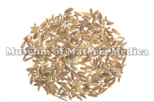Fennel

|
TMPW No.:4895 |
| Synonym | |
| Latin name | Foeniculi Fructus |
| Botanical source: Family name | Umbelliferae |
| Botanical source: Plant name | Foeniculum vulgare Miller (IPNI:842680-1) |
| Part used | Fruit |
| Empirical criteria for quality selection | The outside of good one is ash-yellow-green or ash-yellow. The dark one is not good. It has a strong aroma and sweetish taste when it is chewed. (TN) |
| Constituents | Lipids: Fatty oil Monoterpenoids: d-Limonene, l-Limonene, d-Fenchone, d-Pinene, Dipentene, β-Pinene, Camphene, γ-Terpinene, p-Cymene, Camphor Phenylpropanoids: Anethole, Estragole Other aromatic derivatives: Anisaldehyde |
| Pharmacological effects | Hyperperistalsis of intestinal tract (fennel oil) |
| Indications | It is used as an aromatic stomachic, carminative, expectorant agent and also as a spice. In Chinese traditional medicine, it is applied, as painkiller, to treat lower abdominal pain and colic of cold and yin type. |
| Diseases | Coldness of limbs, Lower abdominal pain, Pain of testis, Scrotal hydrocele, Upper abdominal pain, Vomitting, Anorexia |
| Formulas | anchusan , anchusankabukuryo , kishukunichinto , chokoshiteito |
| Meridian tropism | Liver, Kidney, Spleen, Stomach |
| Property | Warm |
| Flavor | Acrid/pungent |
| Classification in "Shen-non Ben-cao Jing" | |
| TCM: Classification | Drugs for dispelling internal cold |
| TCM: Medicinal effects | To dispel cold and relieve pain, to regulate the stomach function. For scrotal hernia with pain and cold extremities, dysmenorrhea with lower abdominal pain and cold sensation, distending pain in the epigastrium with anorexia, vomiting and diarrhea, hydrocele with tunica vaginalis. |
| Remarks | Listed in the Japanese Pharmacopoeia 18th ed. |
| References | TN: T. Namba & Y. Tsuda ed., Outline of Pharmacognosy, a Textbook, 3rd ed., Nankodo Co., Ltd., Tokyo, 1998. |
